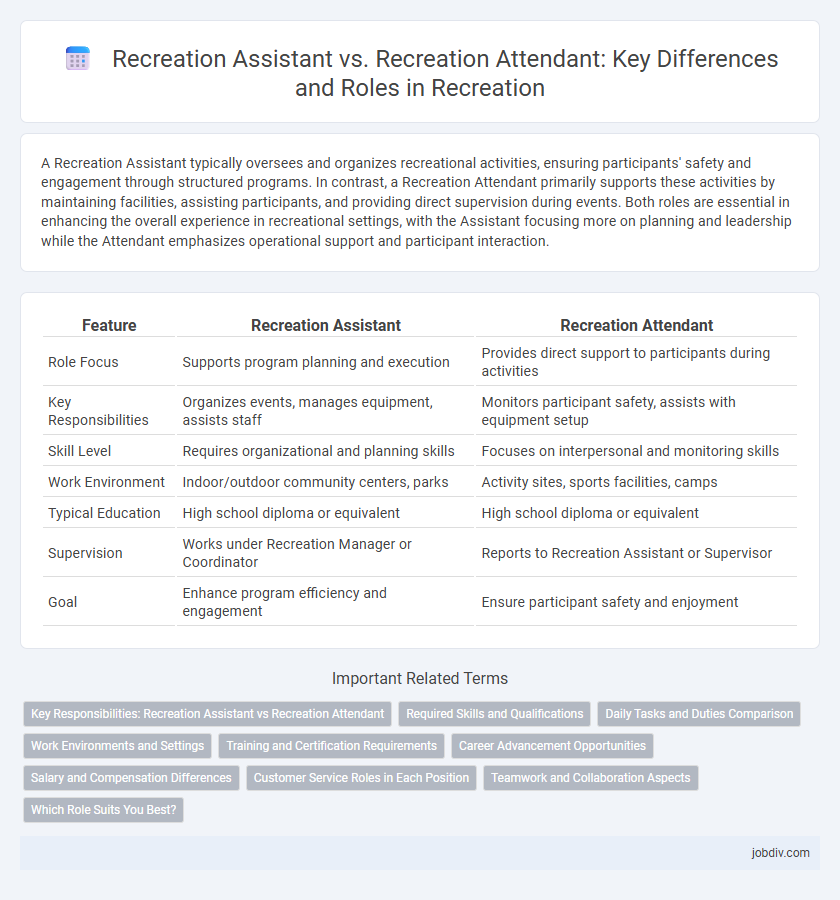A Recreation Assistant typically oversees and organizes recreational activities, ensuring participants' safety and engagement through structured programs. In contrast, a Recreation Attendant primarily supports these activities by maintaining facilities, assisting participants, and providing direct supervision during events. Both roles are essential in enhancing the overall experience in recreational settings, with the Assistant focusing more on planning and leadership while the Attendant emphasizes operational support and participant interaction.
Table of Comparison
| Feature | Recreation Assistant | Recreation Attendant |
|---|---|---|
| Role Focus | Supports program planning and execution | Provides direct support to participants during activities |
| Key Responsibilities | Organizes events, manages equipment, assists staff | Monitors participant safety, assists with equipment setup |
| Skill Level | Requires organizational and planning skills | Focuses on interpersonal and monitoring skills |
| Work Environment | Indoor/outdoor community centers, parks | Activity sites, sports facilities, camps |
| Typical Education | High school diploma or equivalent | High school diploma or equivalent |
| Supervision | Works under Recreation Manager or Coordinator | Reports to Recreation Assistant or Supervisor |
| Goal | Enhance program efficiency and engagement | Ensure participant safety and enjoyment |
Key Responsibilities: Recreation Assistant vs Recreation Attendant
Recreation Assistants coordinate and facilitate recreational activities, provide program support, and ensure participant safety during events. Recreation Attendants maintain facilities, set up equipment, and assist participants by providing information and monitoring activity areas. Both roles require strong interpersonal skills, but Recreation Assistants focus more on program management while Attendants emphasize operational support.
Required Skills and Qualifications
Recreation Assistants typically require strong organizational skills, customer service experience, and basic first aid certification to support program planning and ensure participant safety. Recreation Attendants focus more on direct supervision and facility maintenance, necessitating excellent communication skills, physical stamina, and knowledge of safety protocols. Both roles benefit from certifications such as CPR and experience with recreational software or equipment.
Daily Tasks and Duties Comparison
Recreation Assistants develop and lead activity programs, coordinate event logistics, and ensure participant safety during recreational events. Recreation Attendants maintain facilities, set up equipment, provide customer service, and assist with event preparation and cleanup. Both roles contribute to enhancing recreational experiences but differ in leadership and operational responsibilities.
Work Environments and Settings
Recreation Assistants typically work in community centers, parks, and recreational facilities, supporting program planning and facilitating participant engagement. Recreation Attendants are more commonly found in specific venues such as swimming pools, fitness centers, or sports complexes, where they monitor safety and assist with equipment. Both roles contribute to creating safe, enjoyable environments but differ in the scope of their responsibilities and settings.
Training and Certification Requirements
Recreation Assistants often require a high school diploma and basic first aid certification, with on-the-job training to develop skills in program delivery and customer service. Recreation Attendants typically need minimal formal education but must complete safety training and may receive certification in CPR or lifeguarding depending on the facility. Both roles benefit from specialized certifications in recreation management, emergency response, and communication to enhance performance and ensure participant safety.
Career Advancement Opportunities
Recreation Assistants typically have entry-level responsibilities, focusing on supporting recreation programs and assisting participants, making it ideal for gaining foundational experience. Recreation Attendants often have more direct interaction with clients and facility management duties, providing opportunities to develop leadership and organizational skills. Career advancement from Recreation Assistant to Attendant can lead to supervisory roles, specialized program coordinator positions, or management in leisure services.
Salary and Compensation Differences
Recreation Assistants typically earn a higher average salary ranging from $28,000 to $35,000 annually, reflecting responsibilities such as planning and leading activities. Recreation Attendants usually receive compensation between $22,000 and $28,000, focusing more on facility upkeep and customer support duties. Benefits packages vary but often include health insurance, paid time off, and sometimes performance-based bonuses for Recreation Assistants.
Customer Service Roles in Each Position
Recreation assistants provide interactive customer service by organizing activities and ensuring participant engagement, focusing on enhancing visitor experiences through direct support and communication. Recreation attendants typically handle facility maintenance and monitor safety, offering customer service by addressing immediate needs and maintaining a welcoming environment. Both roles require strong interpersonal skills, but assistants emphasize program facilitation while attendants prioritize operational support within recreational settings.
Teamwork and Collaboration Aspects
Recreation Assistants coordinate with program leaders and facility staff to ensure smooth operation of recreational activities, emphasizing effective teamwork and clear communication. Recreation Attendants support these efforts by maintaining equipment and assisting participants, fostering collaboration through hands-on involvement and responsiveness. Both roles require a shared commitment to enhancing participant experiences through cooperative interaction and mutual support.
Which Role Suits You Best?
Recreation Assistants typically plan and organize activities, requiring strong communication and leadership skills, while Recreation Attendants focus on supervising and maintaining safety during recreational events. If you enjoy creating engaging programs and managing logistics, the Assistant role suits you best; if you prefer hands-on interaction and ensuring a safe environment, the Attendant role is ideal. Both positions demand a passion for recreation and excellent interpersonal abilities to enhance participant experiences.
Recreation Assistant vs Recreation Attendant Infographic

 jobdiv.com
jobdiv.com